- Home
- Jim Thompson
Heed the Thunder Page 8
Heed the Thunder Read online
Page 8
“I’m afraid my sister isn’t very considerate of you,” she said, scooping delicately at her egg. “It’s—uh—beastly weather for one to take such a long drive.”
“Beastly,” he agreed gravely. “But what can one do?”
“Nothing, I suppose. After all, where one’s own sister—one’s own sister-in-law—is involved, one must make sacrifices.”
“Exactly. One must, despite the inconvenience it causes one.”
She shot a quick glance at him which was almost suspicious, but there was nothing in his expression to indicate that he might have been mocking her.
“Well, it does seem, though,” she said, “that Edie could handle her own difficulties. It isn’t very nice of her to go complaining to the family and dragging you into it.”
“Oh, she didn’t,” said Courtland. “I thought I’d explained how it was. Old Jabowski let out something about it when he was at the blacksmith shop, and of course we heard about it inside of an hour. Barkley would have gone himself, but”—he smiled wryly—“it would be a little out of place for Barkley to go calling on a bunch of hunkies.”
“I don’t see why either of you should do anything,” said Myrtle.
Courtland’s thin arched eyebrows shot up. He appeared to be on the point of saying something; then he shrugged as if dispelling an unpleasant thought, and readdressed himself to his eggs.
Myrtle lowered her eyes uncomfortably. “I’m afraid I sound as though I’m not interested in Edie’s welfare.…I didn’t mean it that way.”
“Naturally, you didn’t,” said Alfred.
“I was only thinking of you. It seemed to me that some closer member of the family—”
“Some closer member of the family must not even hear of it,” said Courtland firmly. “That’s exactly what Barkley wants to avoid. He hasn’t even told Bella for fear she would repeat it to Grant. I don’t believe that he himself would do anything, but—oh, pardon me, dear—”
“That’s quite all right, dear.” She gave him a smile of understanding and forgiveness. “I know Grant.”
“Well, you know what would happen if Sherman or your father got hold of the story. You know what they would do if they heard that a bunch of filthy bohunks had mauled Edie. There’d be murder.” He shrugged deprecatingly. “Not that we care about the hunkies, but we don’t want the family involved in murder. And, of course, the bank doesn’t want to lose any customers. That last is Bark’s big worry.”
He glanced at his watch, his one really valuable possession, and stood up.
“I’ll have to run. I should have been on my way before.”
“You’ll be back tonight?”
“Oh, certainly.”
She followed him into the living room and helped him on with the greatcoat made of a cow’s hide. He tied a scarf around his head and jammed his hat on over it. His cap with earmuffs would have been more comfortable, but comfort was a minor consideration today. He needed to look a part that he knew well—the part of a lord administering to the peasantry.
On the point of leaving, he went into the bedroom with the excuse of obtaining a clean handkerchief, and dug up his quirt, a relic of palmier days. He made a coil of the oiled leather and shoved it deep into his pocket.
He pecked at Myrtle again and departed.
She watched him go, disconsolately. Then, a polite frown on her deliberately well-bred face, she went into the kitchen and examined the box of mercury salve. It was almost gone again, and he had received it less than a month ago. It came from some place back East, and it cost ten dollars a box. She had never been so indelicate, of course, as to press him for its reason; and, anyway, she believed she knew. He had dropped a vague hint or two, and her ignorance had supplied the rest. She believed it was for some normal function of men, parallel to, but considerably more painful than, a woman’s menses. She guessed that it probably had something to do with their coition—something perfectly all right, of course.
The housework of her little establishment was done in an hour, and she picked up a book and tried to read. Most of their surplus cash went for books and the salve. After a few minutes she laid the book down and sat looking drearily out the window. Being entertained by other people involved entertaining them, so she seldom went visiting. She had no money to go shopping with, and she could not go alone to town anyway. She thought of Bobbie and smiled, and wished that he wasn’t in school. If he were with her, they would play games together—nice, sedate, refined games, of course—and then they would have tea together, and she would show him how little English gentlemen acted.
Bobbie was really an awful good—an excellent child.
Edie did not know how to bring him up.
She wondered what was wrong with her that she had no children.
It wouldn’t cost much more to have a child. Just one. If Edie could have one, why couldn’t she? If Edie could have a child, with her husband gone off goodness knew where, why couldn’t…
She wondered what was wrong with her.
Impulsively, she jumped up and drew the shades. And she turned back to the cooling shabby room with a strange light in her self-doubting eyes. She smiled with gentle firmness at the shiny spring-punctured sofa.
“Come, young Alfred,” she cooed.
“Certainly, Mother, dear. Is it time for our Conrad?”
“In a few minutes. I’m giving you such a marvelous tea. Crumpets, and strawberry jam, and—and—fresh kippers!”
“But how splendid, Mother!”
Stricken by a sudden feeling of disloyalty, she dropped the game and began another: the game of how-lucky-I-am.
She thought of how good-looking, how brilliant, how refined Alfred was. She remembered that he always helped her to food before he helped himself; his way of over-quickly satisfying his appetite when there was little food. And he was always interested in what she had to say. He didn’t scoff and jeer like Pa and Sherman did whenever Josephine or Ma said anything.
She let her mind go back to that night when he had first come to Verdon. He had looked so sweet, so nice, coming down the road, binoculars swung over his shoulders and an expensive tooled-leather bag in each hand. And, yes, the poor dear had been hugging a sack of groceries under one arm and a frying pan under the other. The town loafers had been responsible for that. They had said, “Why, sure, stranger. Just step out here anywheres and stake you out a claim. Go out here to Link Fargo’s place. He’s got more land than he knows what to do with, and he’ll give you some. But take your own grub along. Link don’t eat nothin’ but b’ar meat.”
So he had come to the gate, looking so cute and ridiculous, and asked Pa if he would mind giving him a few hundred acres. And Pa had said he’d give him a thousand if he wanted it, but it’d be smart for him to walk on up into the sand-hills where there was still lots of gold left.
Alfred had set down all his bags and stuff, so that he could tip his hat and thank Pa properly, and then had started picking them up again. But every time he got hold of part of them, he would drop something.
And, then, she had come out and told him the truth. And he had smiled so nicely, even laughed, and not shown at all how disappointed he was. And Pa had laughed and said he’d been a bigger damned fool himself lots of times, and asked Alfred to come on in and stay for supper.
And…
Myrtle jumped up and ran into the kitchen. She jerked a lid off the stove and saw that the fire was almost out. Snatching up the coal hod, she tore out the back door to the shed adjoining the privy. She filled the hod, frowning at the scanty stock that remained. They were always out of something, it seemed. But usually it was coal. And she tried to be so careful, too. They didn’t have a heater, only the kitchen range, and she was always letting the fire go out in that, so hard did she try to economize. Some days she did let it go out, going to bed with her clothes on to keep warm.
Back inside the house she turned the damper on the stove and shoved a few stingy pieces of coal onto the scuttle. She raised it regre
tfully, hating to release the penny or two it represented.
Perhaps it would be a good idea to go to bed today. Alfred wouldn’t be home until late. She could get up around five and have the house warm and dinner ready in plenty of time.
She put the lid back on the stove and let the coal slide back into the hod. She poured water into the basin on the washstand, washed the traces of coal dust from her hands, and went into the bedroom. She put on her coat, a long black tailored affair which extended to her ankles, and turned down the bed.
Then, with a little moan, she turned away from it. Not today. She couldn’t stand it today.
Almost grimly she took her ostrich-plumed hat from the closet, jammed it on her head, and fixed it there by a large hatpin with a rhinestone-studded head. She hurried out the front door and down the walk before she could change her mind.
Bella and she had a lot in common. Their menfolk were both bankers, and she wasn’t a whole lot older than Bella. They could talk about the same things and laugh at the people of this poor funny little town. Bella liked her—more than she liked any of the other women, anyway—and she would not return the visit. Bella never went visiting. She said she thought it was silly—a lot of stupid old hens chasing back and forth to each others’ houses. She didn’t mean her, Myrtle, naturally, because she wasn’t old and they were cousins and Barkley didn’t come out to lunch, so it would be all right.
It had better be all right! If it wasn’t, she’d tell Grant, and Grant would listen to her when he wouldn’t to anyone else, and how would Miss Bella Barkley like that?
Turning in at the gate of the brown two-story Barkley home, Myrtle saw that the shades were all drawn, and her nose elevated itself an inch or two. Bella was always making fun of the way people gawked when they passed her home. (As if she had so much anyone wanted to see!) She had even called out to old Mrs. Purnell one day and asked her if she wouldn’t like to stand up to the window.
Myrtle sniffed, silently deciding to keep her own shades drawn.
Her feet made no noise on the snow as she crossed the porch, and her knock broke the silence without warning.
There was no answer to her summons, but she heard a telltale scurrying from the inside. Determinedly, she knocked again. Probably still lying around undressed and here it was almost noon! She’d like to catch her that way, just once, just to see what excuse she would give.
She knocked.
She called, simperingly. “Bella? It’s just me—I.”
Embarrassed, she beat a steady tattoo on the door. Bella was inside and she knew she was there. She couldn’t very well go away now without seeing her and telling her that she had just stopped by on her way some place, just to say hello, and she could really only stay a few minutes.
“Bella! It’s Myrtle!” she called.
And then she blushed. For she heard Bella crossing the floor and fumbling at the latch; and preceding these actions there had been a muttered but quite audible curse.
The door opened a few inches and Mrs. Courtland’s blush deepened. Bella was wearing wine-colored house slippers with giant white pompoms and a thin red silk robe—and nothing else! Not another stitch. Why, even one of her—part of her bosom was exposed. She stared at the girl, reprovingly, and the girl’s black maliciously sparkling eyes met hers unflinchingly.
She was a tall, well-built girl with a daring coiffure which allowed a black curling fringe of bangs across her forehead. Now, as she coolly looked at Myrtle, an unpleasant smile curving her red lips, she drew the robe more tightly around her and gave the bangs a bored pat.
“Well?” she said.
“Why—why, I was just passing by, Bella.…”
“Yes?”
“Well—well, I hadn’t seen you in such a long time, I thought I’d just stop in and see how you were.”
“I’m all right,” said Bella. “I’ve been lying down.”
“Oh. Well, I hope you haven’t been ill.”
“No. But I’m going to lie down again.”
“Well…well, if you’re lying down, you must be ill.”
“Not necessarily,” said Bella, and a secret amusement grew in the malicious depths of her eyes. “Is that the only time you lie down?”
Myrtle reddened. She stammered idiotic meaningless things. She heard herself asking if she could borrow a cup of tea, though goodness knew tea was the one thing she and Alfred always had plenty of.
Bella shrugged a curt assent.
“Just a moment,” she said, and she started to close the door. But even she was not equal to that rudeness. She left it open its original few inches, and disappeared.
Trembling with mortification, Mrs. Courtland waited.
She had forgotten, in her inherent timidity and self-doubt, what she should think of Bella. She could think only of what Bella must think of her. Perhaps she had looked into the house one day and seen her in bed with her clothes on. That was what she must have meant by that lying down business.
Perhaps she would say something to her father about it, and he would say something to Alfred. Maybe he had already done it! Alfred would never mention it, he was so reserved, but he would be terribly hurt.
She was almost ready to cry. Poor Alfred! He was so good to her and she had shamed him.
A gust of wind banged the door back against the wall, bringing her out of her reverie. Without thinking, she reached inside to close it. She had no desire to pry—well, she had, but that was not why she did it. Coal was expensive and it was hard to keep a house warm at best. Anyone else would have done the same thing.
With her head inside the door, of course, she was human enough to look around the room.
And so she saw Grant, lying on the lounge, quite nude.
He cursed her, trying to pull a pillow over himself, and in the kitchen Bella dropped the cup of tea and came rushing in. She grabbed the little bank clerk’s wife by the shoulders and began shaking her, warning her of revenge upon her husband if she told. And while his sister’s hair was tumbled over her face by his sweetheart’s fury, Grant, over his first shock, mumbled feeble protests.
“She won’t tell, Bella. Myrtle isn’t like that.”
“You’ll just bet she won’t!” snapped Bella, releasing her victim. And with a scornful laugh she shoved her out the door.
Myrtle walked home, across lots, weeping, frightened, sick. For once, she was glad to crawl in bed.
10
The Nordic peoples, particularly the Germans, were among the best liked and most respected in the valley. Colonials by heritage, they knew how to adapt themselves to new places, how to fit in. But, most important of all, they had not come to the land empty-handed; they had not been driven from their native soil, but had come willingly. The best of an ambitious people, they had come to America, admittedly, because their own country afforded them insufficient opportunities. A proud and industrious people, they came with full pockets, ready and willing to buy what was needed, generous to a fault.
Briefly, they were the antithesis of the hunkies and Rooshans. And they looked down on these latter from an even more lofty pinnacle than did the native Americans. In fact, their own attitude was in no small way responsible for the Americans’ opinion of the “foreigners.”
The Germans intermarried extensively with the native American stock—a commingling made possible by their Protestantism and their unvarying practicality. The German lad invariably took his new wife to a home as good as or better than the one she had come from, and he was always ready and able to assist an impecunious in-law. The German girls were always well-doweried. But they were known to be such excellent housekeepers and mothers that they would have married the best catches anyway.
Philo Barkley once said that if all the Germans, of direct or collateral descent, were removed from the valley, it would not be worth a white man’s staying.
The Germans received papers and periodicals in their own language from abroad, but they were meticulous about subscribing to American national and local
publications; so no one objected. Nor did anyone object to their maintaining their own school, where German and German history were major subjects. It saved the county just that much money, didn’t it? And anyone knew that the German schools were better than ours.
The German schoolmaster was a college graduate, and he spoke five languages fluently. He wasn’t like these silly girls who graduated from the eighth grade, went to normal school for six months, and came back to teach. Just what his salary was no one knew, but judging from his appearance and his standard of living, it was more than adequate. And it was paid in cash—not warrants.
It wasn’t quite noon when Courtland reached the Wilhelm Deutsch farm, but knowing his farmers well, he drove into the yard anyway.
A couple of the smiling Deutsch boys took his horse to the barn for water, feed, and a currying; and fat, beaming old Wilhelm led him into the parlor. The German parlor was not a place for funerals and weddings. They used it every day.
A yellow-haired girl in a spotless house dress served them beer, and another brought in a box of excellent cigars. Without lowering themselves, the family let it be known that they were honored by his presence. Courtland’s reserve melted sufficiently to allow him to tell a story that had become legend in the county:
An old German couple had come into the bank to buy a farm, and they had brought the purchase price, ostensibly, of thirty-five thousand dollars in a gunny sack. When the money was counted, however, it was found to be two thousand dollars short, and the old couple looked at each other in consternation.
Then the old woman had broken the painful silence with a sigh of relief. “It’s all right, Poppa,” she had beamed, “I yoost brought the wrong sack.”
Wilhelm roared at the joke, although he had heard it many times.
“‘I yoost brought the wrong sack,’” he kept repeating, appreciatively, and his jowls were still quivering with laughter as dinner was announced.
It was such a dinner as Courtland had not eaten since—well, since the last time he had stopped at the Deutsch farm. And when he finally and reluctantly departed, he felt sluggish and drowsy. Fortunately, Wilhelm had given him a bottle of applejack as a parting gift, and a few drinks of that dispelled his sleepiness.

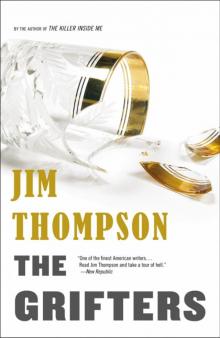 The Grifters
The Grifters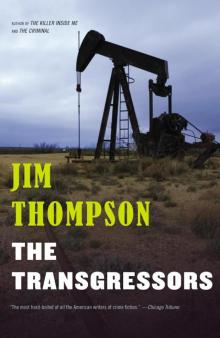 The Transgressors
The Transgressors Texas by the Tail
Texas by the Tail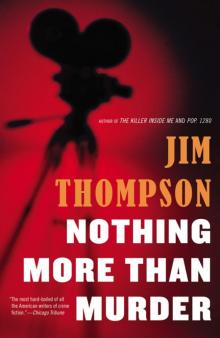 Nothing More Than Murder
Nothing More Than Murder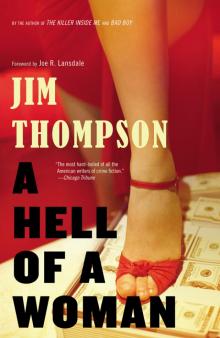 A Hell of a Woman
A Hell of a Woman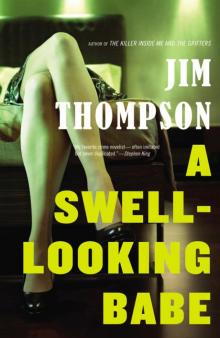 A Swell-Looking Babe
A Swell-Looking Babe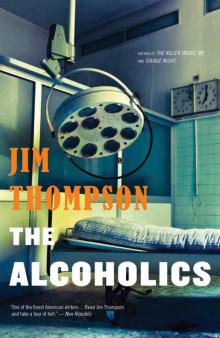 The Alcoholics
The Alcoholics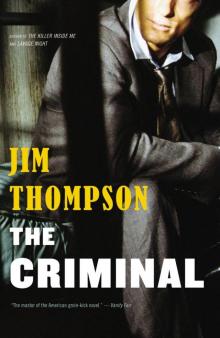 The Criminal
The Criminal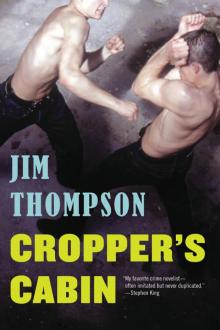 Cropper's Cabin
Cropper's Cabin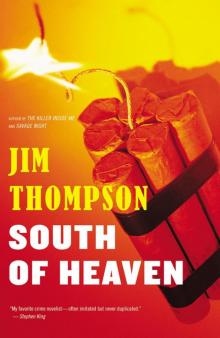 South of Heaven
South of Heaven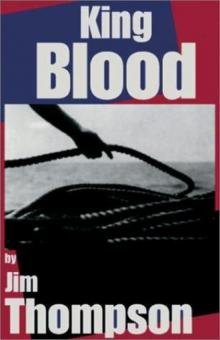 King Blood
King Blood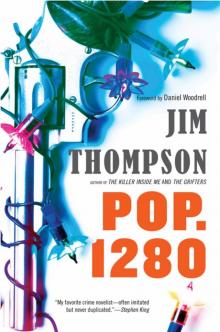 Pop. 1280
Pop. 1280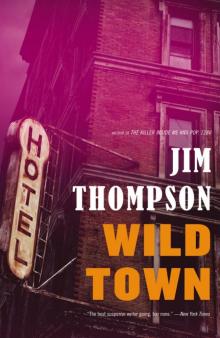 Wild Town
Wild Town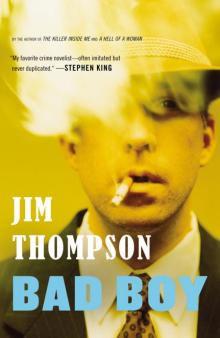 Bad Boy
Bad Boy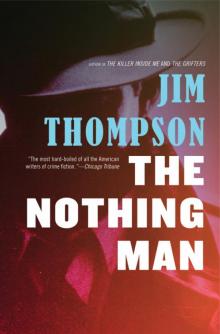 The Nothing Man
The Nothing Man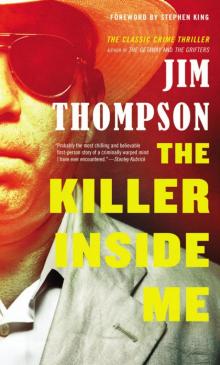 The Killer Inside Me
The Killer Inside Me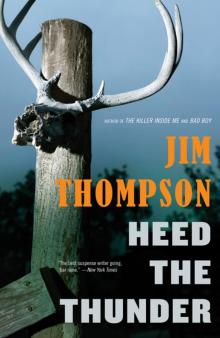 Heed the Thunder
Heed the Thunder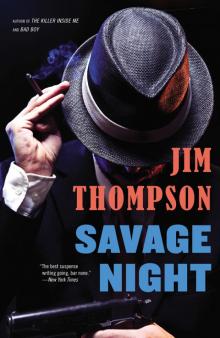 Savage Night
Savage Night Recoil
Recoil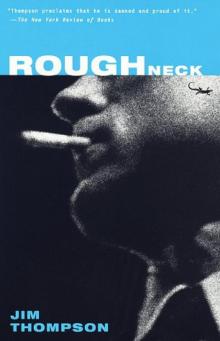 Roughneck
Roughneck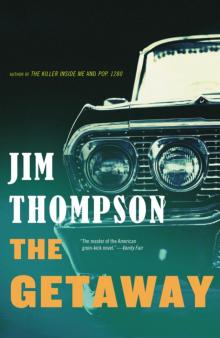 The Getaway
The Getaway